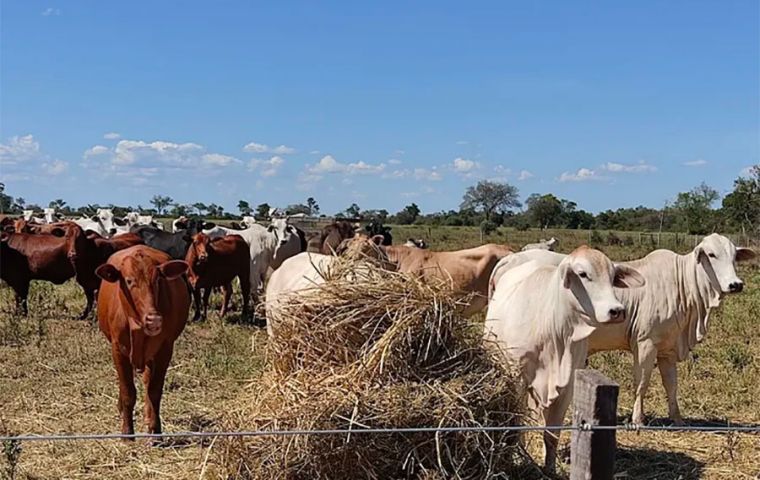MercoPress. South Atlantic News Agency
Paraguay not bowing to global pressure against cattle farming
 There is pressure from the United States and England, who are working on methane reduction plans,” said Bertoni.
There is pressure from the United States and England, who are working on methane reduction plans,” said Bertoni. Paraguay's delegation attending the COP27 climate summit at the Egyptian Red Sea resort of Sharm El-Sheikh Tuesday announced that the South American country would not endorse any collective statement curbing livestock farming.
Agriculture Minister Santiago Moisés Bertoni insisted Paraguay would not sign any agreement affecting livestock at the 27th Conference of the Parties to the United Nations Framework Convention on Climate Change (COP27) because the country has “the firm position of not signing any environmental agreement that puts at risk the productive system” of the national territory.
A joint technical delegation from the Ministry of Agriculture and Livestock (MAG) and the Ministry of Environment and Sustainable Development (Mades) of Paraguay is participating in COP27 in Egypt.
“They propose a 30% reduction in the livestock sector, but they don't tell you how. So, until we do not have sufficient clarity, we will not move forward on the agreements. One of the alternatives could be the reduction of the cattle herd,” the minister said in a radio interview with Asunción's Monumental 1080 AM station.
“First, Paraguay is a country that does not emit and has no greenhouse gases and it makes no sense to make a commitment on a problem that we did not create. Paraguay emits 0.9% of greenhouse gases, so we do not see why we would have to join if we are practically not emitting,” Bertoni stressed.
According to an EFE report, five of the world's largest meat companies and 10 of the world's largest dairy groups together emit as much as the entire European Union, which is 83%.
“Agriculture and livestock do not emit and do not have the capacity to emit greenhouse effects,” Bertoni went on. “We believe that our metric is different from the one they want to impose on us.”
He also hinted that behind the environmentalist concerns were impending hindrances to the future export of Paraguayan products. Bertoni added that Paraguay's pasture systems were very efficient in the national territory and that livestock production works 100% on a grassland system.
”If it was not consuming those pastures (cattle), we were going to have more serious fires. Our production system is sustainable and balanced,“ Bertoni underscored.
Bertoni also pointed out that countries such as the United States and England were advocating the reduction of beef production, due to its impact on methane gas generation, which is harmful to the global climate. The minister also cited the methane agreement by developed countries to reduce the emission of this element which, according to them, is the main accelerator of climate change. ”Yes, there is pressure from the United States and England, who are working on methane reduction plans,” said Bertoni.
The minister also explained that if Paraguay were to reduce its livestock herd, currently 14 million head of cattle, to 10 million, this would imply a significant economic blow.




Top Comments
Disclaimer & comment rulesCommenting for this story is now closed.
If you have a Facebook account, become a fan and comment on our Facebook Page!